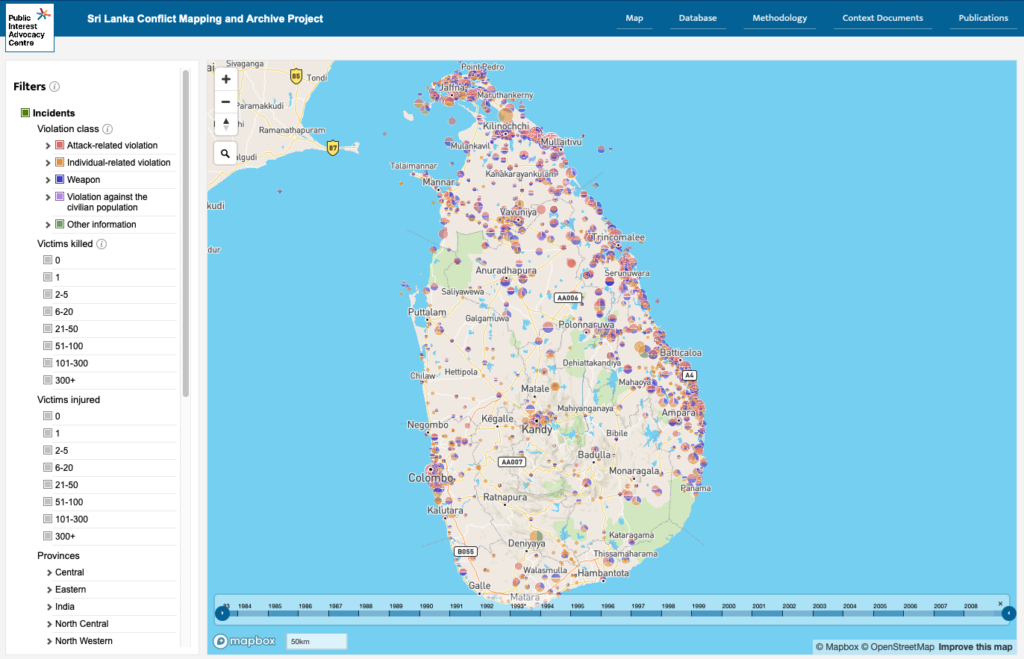by Public Interest Advocacy Centre, Sydney, Australia, September 7, 2022
The Public Interest Advocacy Centre (PIAC) has released a landmark interactive conflict map, detailing thousands of reported human rights violations occurring during the civil war in Sri Lanka between 1983 and 2009. This conflict map will provide crucial foundational support for the United Nations’ and Member States’ work on accountability for human rights violations and related crimes.

The recent political and economic crises in Sri Lanka have highlighted the continued lack of accountability at the highest levels of government. This culture of impunity can be seen most starkly in respect of human rights violations. Victims and their families have been denied the right to truth, justice and reparations for far too long.
In the lead up to the 51st session of the Human Rights Council, and following the recent release of the Comprehensive Report of the United Nations High Commissioner for Human Rights on the situation in Sri Lanka, this Sri Lankan conflict map is a timely reminder of the extent, gravity and widespread nature of violations and the need for accountability.
The conflict map was produced by PIAC’s Conflict Mapping and Archive Project (CMAP) with technical support from the International Peace Information Service (IPIS).
In a welcome development, last year the United Nations Human Rights Council (UNHRC) resolution 46/1 recognised the importance of analysing and preserving evidence relating to violations and abuses of human rights and related crimes in Sri Lanka with a view to advancing accountability. It is crucial that this mandate is continued and even expanded given there are no real prospects for accountability in-country. The recent report of the High Commissioner confirms that while work to address impunity continues, much more still needs to be done. This conflict map will support the work of the UN as well as member states in pursuing their own alternate strategies to advance accountability at the international level.
The interactive conflict map relies solely on open-source information and has been developed using a rigorous methodology. It presents information clearly and accessibly, with a range of search features, so it can be used for truth and accountability processes. It does not attempt to make findings or attribute blame. The map reveals the range and patterns of violations, but also the gaps and trends in reporting and the multitude of questions that remain unanswered. This reinforces the importance of commitments made at the UNHRC to address the instability, violence and suffering caused by the war.
PIAC Truth and Accountability Director, Daniela Gavshon:
‘The international community has continued to show concern for both past and ongoing human rights and international law violations in Sri Lanka. This conflict map highlights how much significant work still needs to be done.’
‘The conflict map is a powerful research tool allowing users to clearly see the extent, range and widespread impact of the conflict on Sri Lankan society, filtered by region, time period, and violation type. It lays the foundations for accountability work, which is much needed and long overdue.’
Former Executive Director of the Institute for International Criminal Investigations and Chief Investigator for various courts and inquiries, John Ralston:
‘Having led the investigation of international crimes and human rights violations in the former Yugoslavia, in Darfur, Sudan, Myanmar and elsewhere, I cannot overstate the value of mapping of crimes as a starting point. For investigations to be effective they need to be founded on a definitive outline of the alleged conduct or events under scrutiny.’
‘PIAC’s CMAP project maps a litany of alleged war crimes and human rights violations over many years in Sri Lanka and will be an extremely valuable resource to ensure accountability for those violations. For Sri Lanka the CMAP database provides a foundation for prosecutions or other accountability measures. Failure to ensure accountability sends a message to parties to other conflicts and to domestic actors that they can commit crimes with impunity.’
Media contacts:
Dan Buhagiar, Media and Communications Manager, 0478 739 280 (outside Australia +61 478 739 280)
[…] Sri Lankan Conflict Map Supports UN Work on Accountability […]